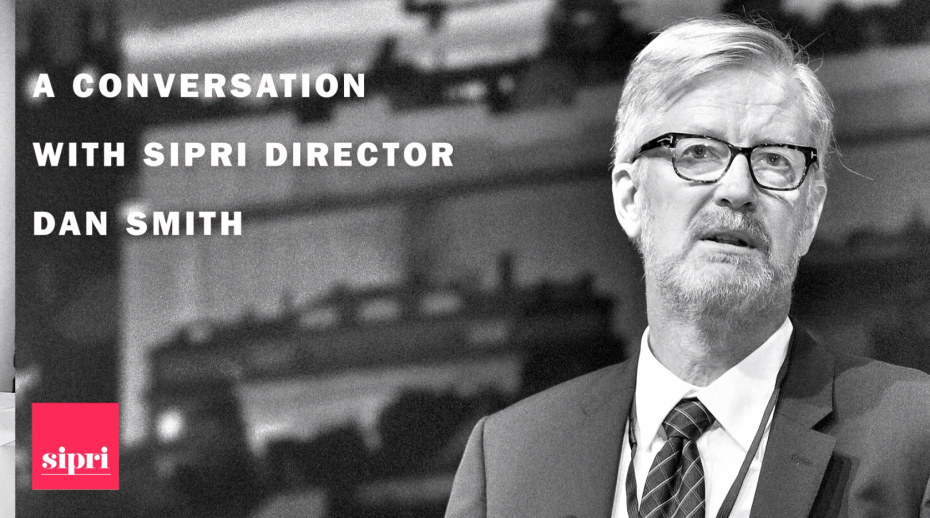 |
| |
| SIPRI launches Peace Points with Dan Smith |
| SIPRI is pleased to announce the launch of the new short-film series Peace Points featuring SIPRI Director Dan Smith. Each video will provide analysis on timely issues, going beyond the news headlines, in the field of peace and security. |
Read more | Watch the series
|
|
|
|
| COMMENTARY |
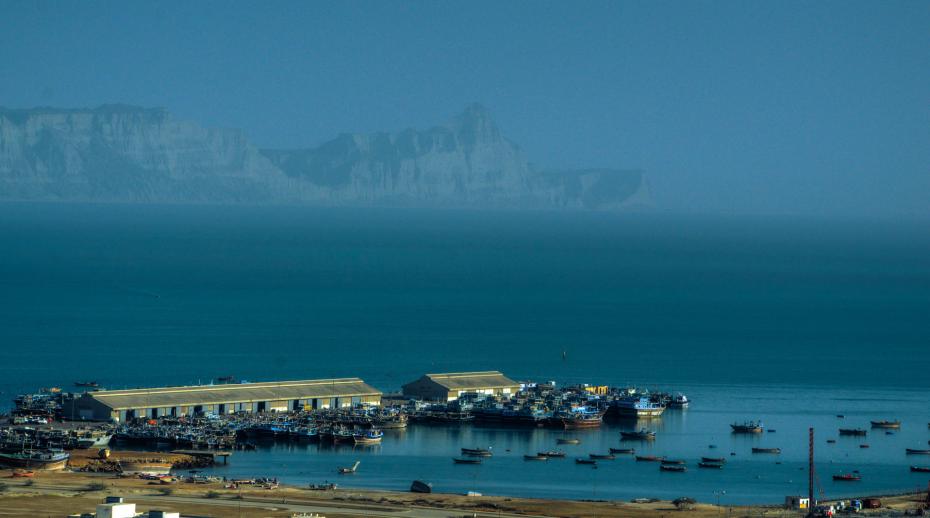 |
| The Silk Road Economic Belt: How does it interact with Eurasian security dynamics |
| China's ambitious Silk Road Economic Belt project aims to provide critical infrastructure across Eurasia. How does this interact with security dynamics in Central and South Asian states? |
| Read the backgrounder |
|
|
| |
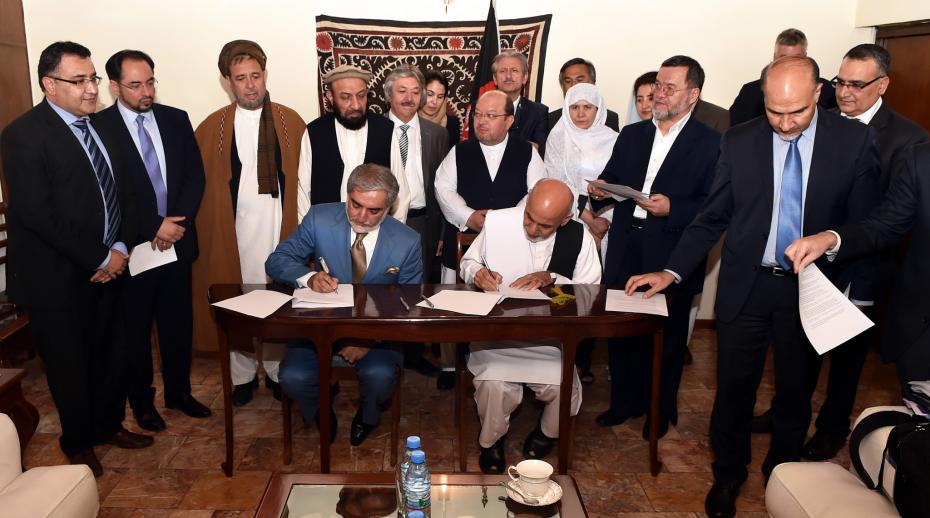 |
| Afghanistan's political elite continue to jeopardize stability |
| Since the formation of the National Unity Government in 2014, Afghanistan's President and Chief Executive Officer have failed to achieve stability in the country. Until the Afghan political elite start to work together, the opportunity for effective government will be wasted. |
| Read the blog post |
|
|
| |
|
|
|
| UPCOMING EVENTS |
| |
| 3–4 May 2017 |
| 2017 Stockholm Forum on Peace and Development |
| SIPRI and the Swedish Ministry for Foreign Affairs are proud to host the 2017 Stockholm Forum on Peace and Development. With the theme of ‘Sustaining Peace: What Works?’, the 2017 Stockholm Forum will identify good practice in peacebuilding interventions and assess how and under what conditions such approaches might be replicated, scaled or modified to meet the needs of other contexts. Please contact SthlmForum@sipri.org with any enquiries. |
| Read more about the Forum | Read Forum partner blog posts |
|
|
| RECENT EVENTS |
| |
| 13 April 2017 |
| African directions: Towards an equitable partnership in peace operations |
| SIPRI's Head of Peace Operations and Conflict Management Programme, Dr Jair van der Lijn, presented the findings of the report African Directions: Towards an Equitable Partnership in Peace Operations at a panel event in New York. The event was co-organized by the Permanent Missions of Ethiopia, Finland and the Netherlands and the Friedrich-Ebert-Stiftung (FES). It aimed to strengthen the global–regional partnership between Africa and the UN. |
| Read more | Read the report |
|
| |
| 6 April 2017 |
| The USA–Russia relationship and the Arctic |
| SIPRI Researcher Ekaterina Klimenko participated in a panel discussion on the upcoming Finnish Arctic Council chairmanship. Finland assumed the chairmanship of the Arctic Council in April in an increasingly uncertain political environment and the discussion explored what this could mean for the Arctic region. The discussion took place at the Finnish Institute of International Affairs. |
| Read more |
|
|
| STAFF NEWS |
| |
| SIPRI welcomes new Chair of its Governing Board |
| SIPRI is pleased to welcome Jan Eliasson as the new Chair of its Governing Board. Eliasson previously served as Deputy Secretary-General of the United Nations from July 2012 to December 2016. He takes over the role of Chair of SIPRI's Governing Board from Ambassador Sven Olof-Petersson. |
| Read more |
|
|
| PUBLICATIONS |
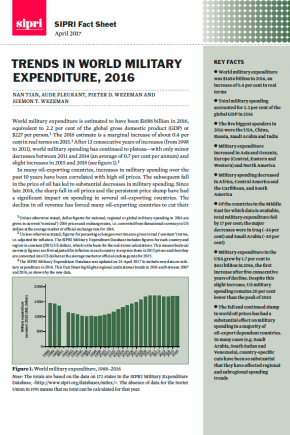 |
| Trends in world military expenditure, 2016 |
| World military expenditure is estimated to have been $1686 billion in 2016, equivalent to 2.2 per cent of the global gross domestic product (GDP) or $227 per person. The 2016 estimate is a marginal increase of about 0.4 per cent in real terms on 2015. From 24 April 2017 the SIPRI Military Expenditure Database includes newly released information on military expenditure in 2016. This Fact Sheet describes the global, regional and national trends in military expenditure that are revealed by the new data. |
| Read the publication |
|
|
| |
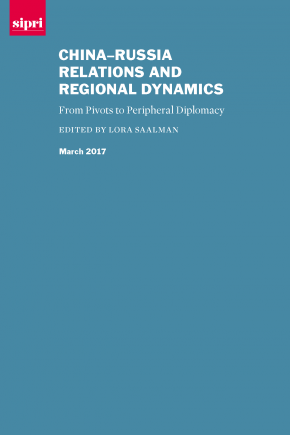 |
| China–Russia relations and regional dynamics: From pivots to peripheral diplomacy |
| The annexation of the Crimean Peninsula by Russia and the onset of armed conflict in eastern Ukraine are often attributed with fostering a new security dynamic in Europe and Asia. This report contains case studies on China and Russia in both non-traditional and traditional security domains from 27 experts from 13 countries. This report explores how regional actors view the impact of Chinese and Russian activities on their strategic domains in North East Asia, South East Asia, South Asia, Central Asia and Europe. |
Read the publication
|
|
|
| |
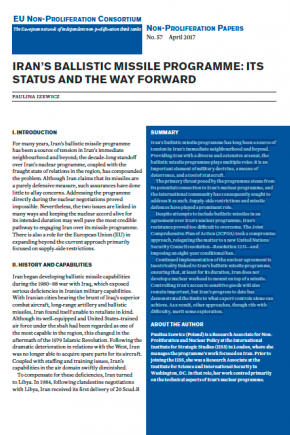 |
| Iran's ballistic missile programme: Its status and the way forward |
| Iran’s ballistic missile programme has long been a source of tension in Iran’s immediate neighbourhood and beyond. Continued implementation of the recent Iranian nuclear agreement is inextricably linked to Iran’s programme, ensuring that, at least for its duration, Iran does not develop a nuclear warhead to mount on top of a missile. Controlling Iran’s access to sensitive goods will also remain important, but Iran’s progress to date has demonstrated the limits to what export controls alone can achieve. As a result, other approaches, though rife with difficulty, merit some exploration. |
| Read the publication |
|
|
| |
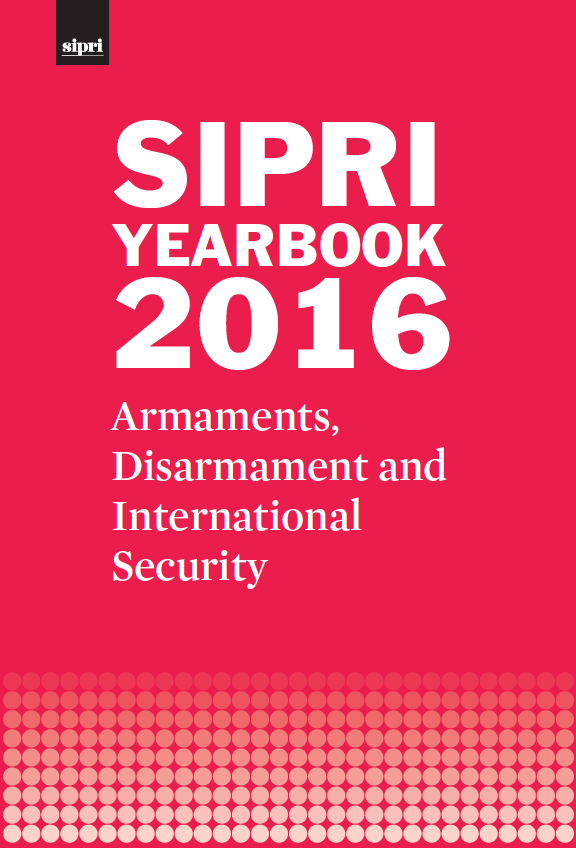 |
| SIPRI Yearbook 2016 |
The 47th edition of the SIPRI Yearbook is a compendium of data and analysis in the areas of security and conflicts; military spending and armaments; and non-proliferation, arms control and disarmament. It covers developments during 2015, including:
- aspects of the conflicts in the Middle East;
- the role and impact of international sanctions on Iran;
- the ongoing peace process in Mali; and
- the implementation of the Sustainable Development Goals.
|
| Browse the contents page | Read the summary (pdf) |
|
|
| |
|
|